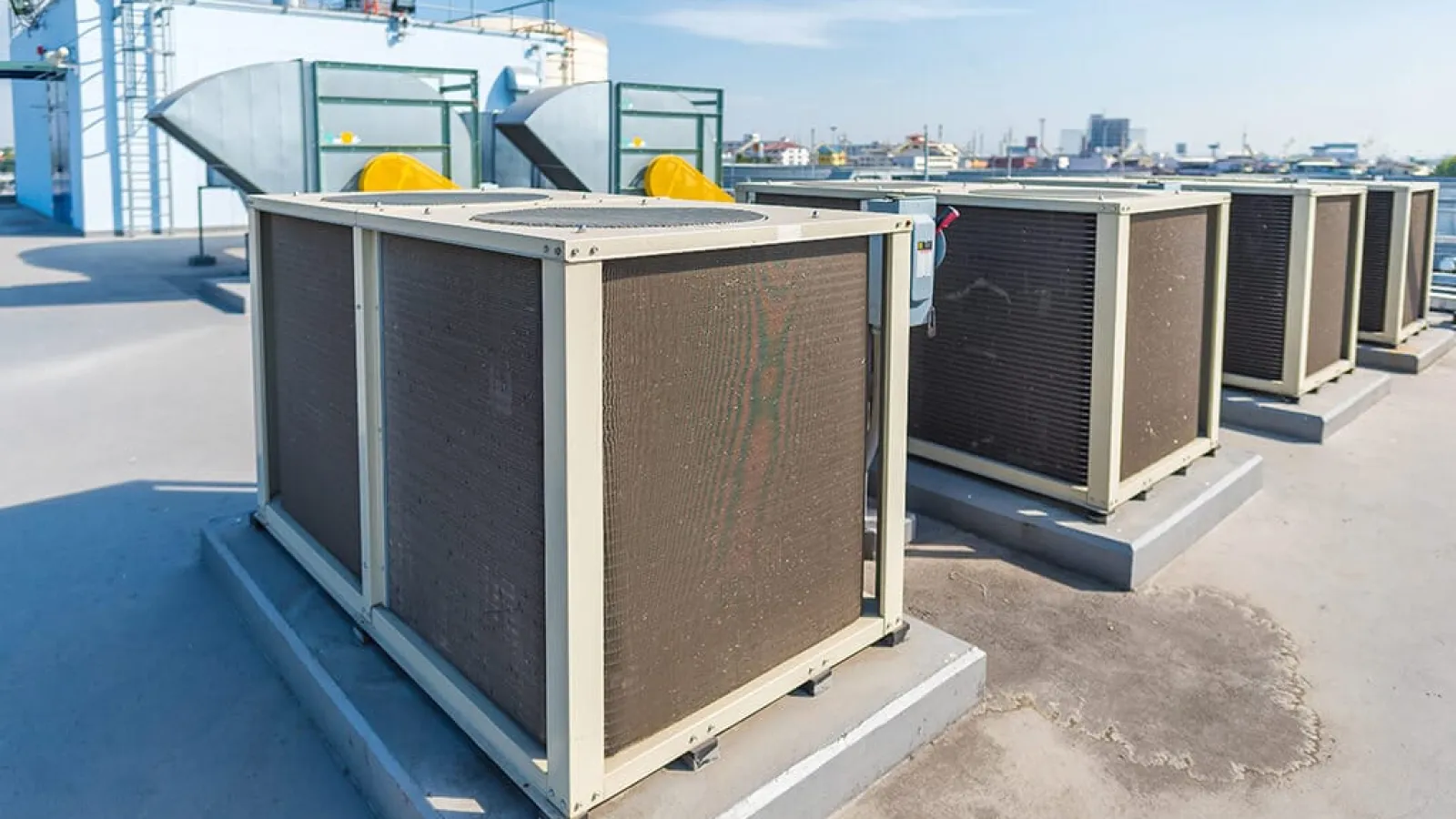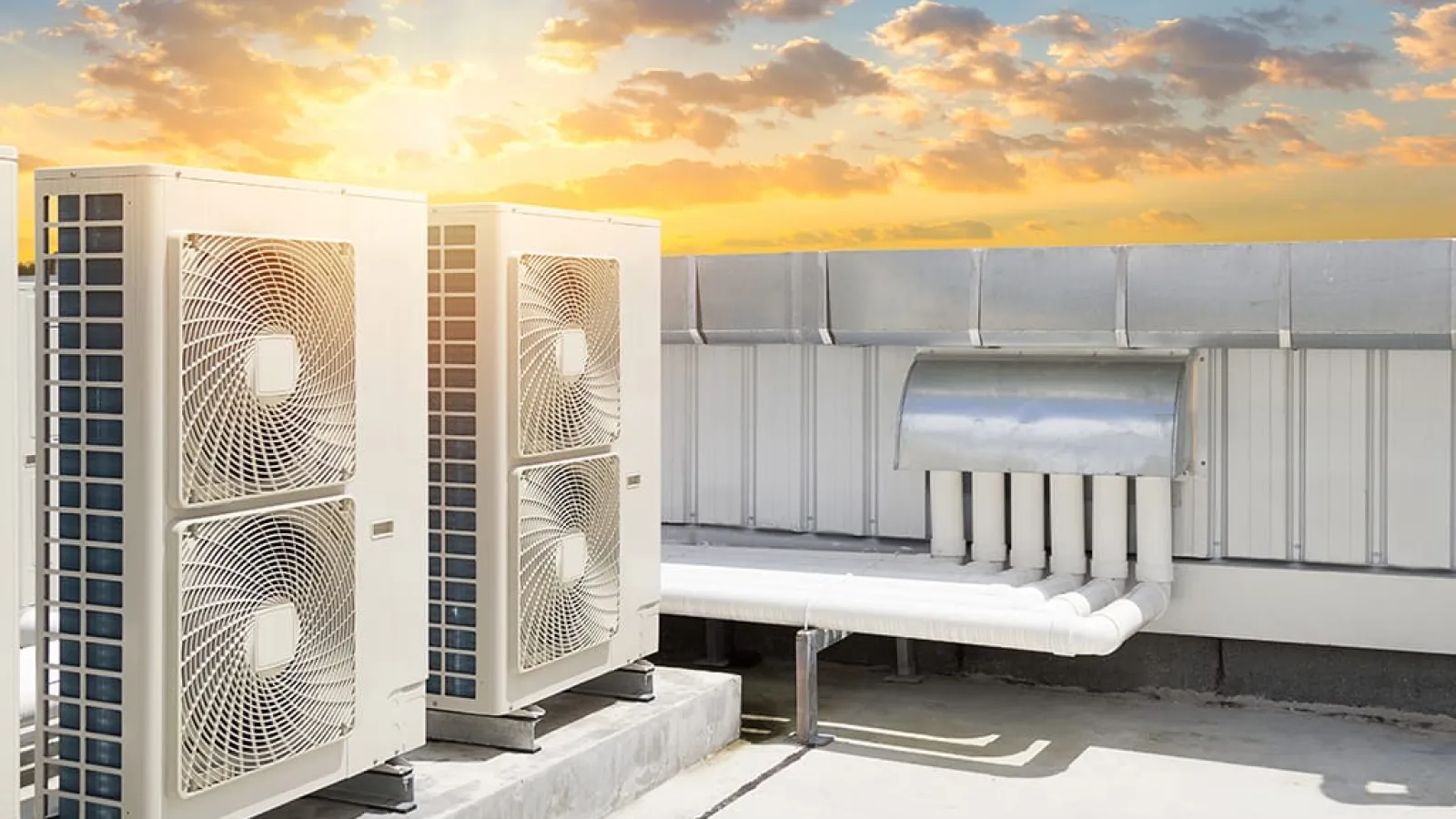Rooftop HVAC units are commonly used in commercial applications to provide heating and/or cooling for smaller buildings. Is a rooftop unit right for your business? In our most recent blog, the HVAC system technicians at Estes Services discuss how rooftop HVAC units work, how they differ from other options, and what their advantages and disadvantages are.
What Is a Rooftop HVAC Unit?
Rooftop HVAC units are usually installed on the roof of a building, though they can also be installed on a slab at ground level. Commercial buildings with flat roofs have ample space atop the structure for installation of HVAC equipment. On the roof, HVAC systems are protected from theft and ground space is conserved.
Rooftop HVAC units are also called packaged units, as all components are packaged together in one cabinet. Inside the cabinet housing are all of the heating and/or cooling system components, depending on the type of system. Because of their environmental exposure, rooftop units are built to withstand sunlight, rain, wind, frost, and other conditions.
Rooftops units are different from split systems, which have separate equipment housed indoors and outdoors. A furnace and/or air handler is installed within the building, while an air conditioner or heat pump is installed outside the building around its perimeter.
How Do Rooftop Heating and Cooling Units Work?
Rooftop HVAC units function similarly to other types of heating and cooling equipment, providing efficient comfort to occupants. These systems are connected to the building’s ductwork and heat or cool air passing through then distribute conditioned air throughout the interior areas.
- Air enters a rooftop unit via the air hood at its side. The air hood looks like an awning with an opening below it, which allows air to enter while keeping rain and snow out.
- As air passes through, dampers operate inside to regulate airflow, and the air supply passes through the system’s filters to remove contaminants.
- Next, air is either heated by a heat exchanger or coils, or cooled by cooling coils (depending on system configuration and operating mode).
- Lastly, the fan circulates conditioned air through the ducts of the building.
Why Install Rooftop HVAC Units?
There are several reasons Atlanta area business owners choose to install rooftop HVAC units for their facilities, including:
Space Savings
In commercial buildings, square footage is at a premium. Because all HVAC components can be installed atop the building, a rooftop unit frees up the space that would be consumed by indoor equipment if a split system was in use.
Security
Because of their installation location, rooftop HVAC units are largely protected from theft and vandalism. HVAC units installed at ground level are easier to access. Copper theft or vandalism could cost a business valuable production time if the facility is left without heating or cooling.
Quiet Operation
With all components housed outside of the building, operating noise isn’t as noticeable indoors as when a split system is in use. Rooftop systems minimize distraction within the building.
Easy Access
With all components housed together, rooftop HVAC units can be easier for technicians to access. Maintenance and repairs may be made quicker with all parts in one location.
You May Want to Avoid a Rooftop Unit If…
Rooftop HVAC units aren’t for everyone. Here are some reasons you may prefer to choose another type of commercial HVAC system:
Potential Roofing Damage
Rooftop HVAC units are heavy. Their weight can cause damage to a flat roof membrane if installation is botched, leading to leaks and even pooling water, which degrade the roof.
Storm Damage
While built to withstand the elements, rooftop units can sustain storm damage due to lightning strikes, high winds, and other weather-related damage. While this damage is possible in split system components installed at ground level, it is more common among rooftop units.
Commercial Heating & Cooling with Estes Services
Estes Services helps Atlanta business owners heat and cool their buildings efficiently. Our team installs, repairs, and maintains rooftop HVAC units throughout the city and surrounding areas. If your rooftop system is in need of service or replacement, contact us today! For all of your commercial heating and cooling needs, contact the professional technicians at Estes Services today.




